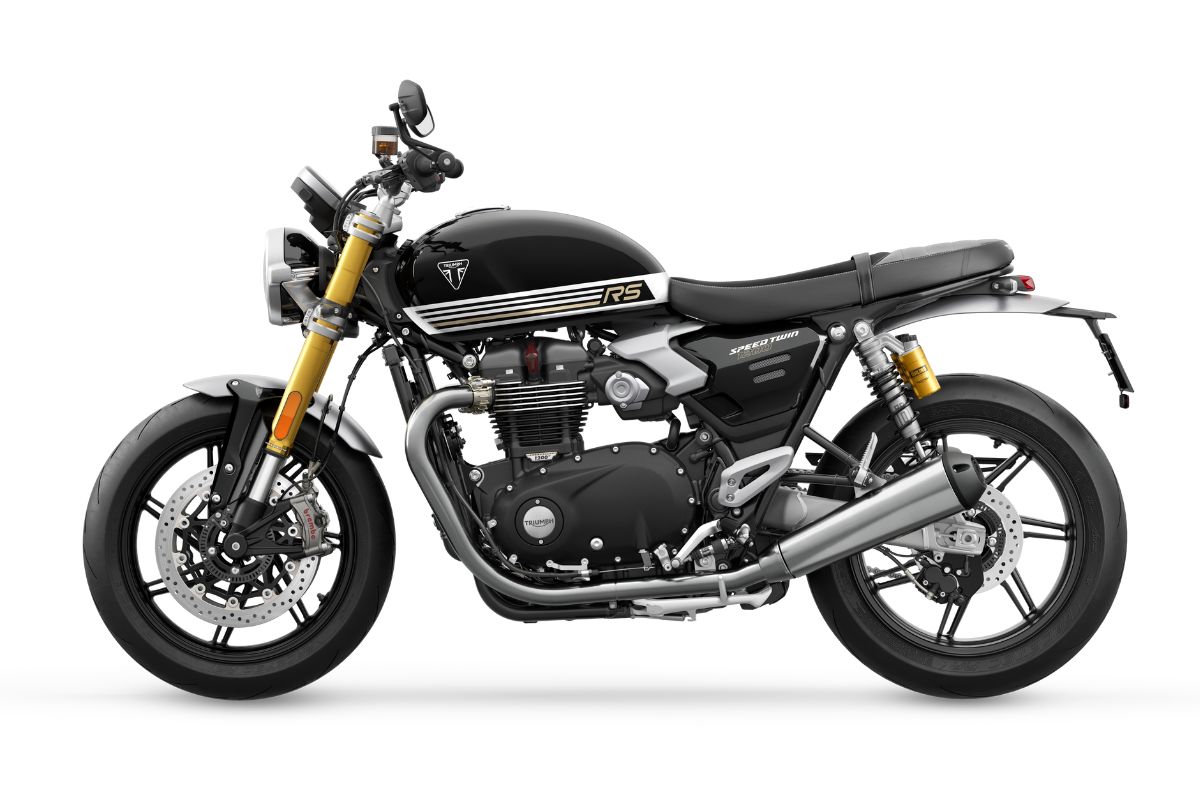Triumph has taken the covers off the updated Speed Twin 1200 models and now you have two variants – standard and RS. The difference between the two boils down to underpinnings and slight ergonomic revisions.
- Engine in both bikes rated for 105hp, 112Nm of torque
- Bidirectional quickshifter exclusive to RS variant
- RS variant has more focused ergos compared to base 1200
Triumph Speed Twin 1200 lineup: Design, features details
A lot has changed on the Speed Twin 1200 and the biggest change is in how the bike looks. Now it uses the same LED headlight as the Speedmaster and Triumph says the goal with this update was to make the bike sleeker. To that end, the updated Speed Twin models use new engine casings, inverted shock absorbers at the rear instead of RSU units and narrower exhaust mufflers.
Instrumentation on the Speed Twin 1200 models has also changed with twin digi-analogue dials making way for the LCD display from the Trident 660 which is being seen on a growing number of Triumphs now. The switchgear on the new Speed Twin 1200s too is the same as the Trident and a USB-C charging port is standard.
The standard Speed Twin 1200 can be had in three colours – white, red and silver, while the RS variant can be had in two paint options- black and orange. In typical Triumph fashion, there are a vast number of factory-supplied optional extras available including, for the first time, clip-on bars and a solo seat for that quintessential cafe racer look.
Triumph Speed Twin 1200 lineup: changes under the new skin
Both the Speed Twin 1200 and the RS are powered by the same liquid-cooled, 1,200cc, parallel-twin as before but this motor now gets a new cam, a sportier tune and a higher 8,000rpm redline. It is now rated for 105hp at 7,750rpm and 112Nm at 4,250rpm. Power is up by 5hp and is made 500rpm later in the rev band; this is the same output as erstwhile Thruxton RS.
Both models come with a slip-and-assist clutch controlled 6-speed gearbox but only the RS variant can be had with a bidirectional quickshifter – the first Triumph neo retro model to do so. This cannot be fitted to the standard Speed Twin 1200 due to the differing footpeg placement on it.
Speaking of ergonomics, the handlebar on the standard Speed Twin 1200 has been moved up and back toward the rider, with the footpegs also placed in a relatively roomier manner compared to the RS variant. It also has a lower 805mm seat height compared to both the RS and the outgoing bike.
Being the sporty variant, the RS has relatively more aggressive ergonomics, with a lower, forward-set handlebar and higher, more rearset footpegs. It also has a taller 810mm seat height and is suspended by a fully-adjustable Marzocchi fork and Ohlins shock absorbers. Braking duties are handled by superbike-spec Brembo Stylema calipers clamping down on twin 320mm discs. Like the current Speed Twin 1200, the RS rolls on Metzeler Racetec RR tyres.
Cycle parts on the base Speed Twin 1200 are predictably simpler than the RS. Suspension is handled by a non-adjustable 43mm fork and twin shock absorbers, both courtesy of Marzocchi. Braking is handled by Triumph-branded radial 4-piston calipers biting down upon dual 320mm discs and the regular Speed Twin rolls on Metzeler M9RR rubber.
While cornering ABS, traction control as well as the Road and Rain riding modes are standard on both bikes, the RS variant gets an additional Sport mode and the bidirectional quickshifter. Cosmetic bits that are exclusive to the RS include aluminium front and rear fenders and premium stitching on the seat.
Internationally, the base Triumph Speed Twin 1200 will cost GBP 12,495, which is a step up from the current model’s GBP 11,995 price tag, and the RS is priced at GBP 14,495. Currently, the Speed Twin 1200 is priced at Rs 11.09 lakh in India and it remains to be seen what pricing strategy Bajaj adopts when the new 1200s make their way to India.
Also see:


